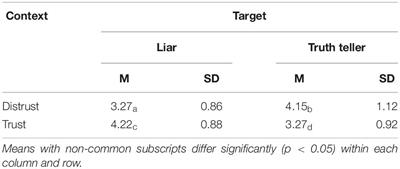The limits of conscious deception detection: When reliance on false deception cues contributes to inaccurate judgments
People are generally too trusting, which decreases their ability to detect deceit.This suggests that distrust could enhance our deception detection abilities.

. Yet, a state of distrust may induce deliberative conscious thought. This mode of thinking has been related to worse complex decision making. Hence, we investigate whether contextual distrust decreases the ability to detect deceit via the stronger reliance on consciously held beliefs about which cues betray deception. In two studies, participants were asked to judge videos of either deceiving or truth telling targets. Contextual distrust was manipulated by asking participants to squint their eyes (distrust) or to round their eyes (trust) while watching the videos. Participants’ judgments of targets being deceptive or truthful were measured (Studies 1 2) and they were asked on what basis they made these judgments (Study 2). Results showed that distrust especially hampers the detection of truth, which is partly due to more reliance on false beliefs about deception cues.
These results corroborate the idea that deliberative conscious information processing may hinder truth detection, while intuitive information processing may facilitate it. .
Read the full article at the original website
References:
